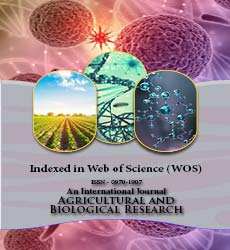Agricultural and Biological Research
RNI # 24/103/2012-R1
Surabhi Sharma, Bankey Lal*, Arun Kumar Verma and Vipul Pratap Singh
A number of important elements, including social justice, economic sustainability and environmental health, are integrated into precision farming. In order to achieve this, it emphasizes the precise management of crops through the use of state-of-the-art technologies such as Remote Sensing (RS), Geographic Information Systems (GIS) and Global Positioning System (GPS) in conjunction with ground equipment like yield monitors, Variable Rate Applicators (VRA) and computer systems with the necessary software. Precision agriculture is essentially a systematic strategy that aims to restructure the entire agricultural system in order to adopt a farming model that is high-efficiency, low-input and sustainable. Prioritizing technology-driven horticulture precision farming as a potential solution is becoming more and more necessary in light of the escalating challenges presented by an expanding global population and unexpected environmental fluctuations. This approach holds great potential for addressing these pressing issues and ensuring the future sustainability of agriculture.
